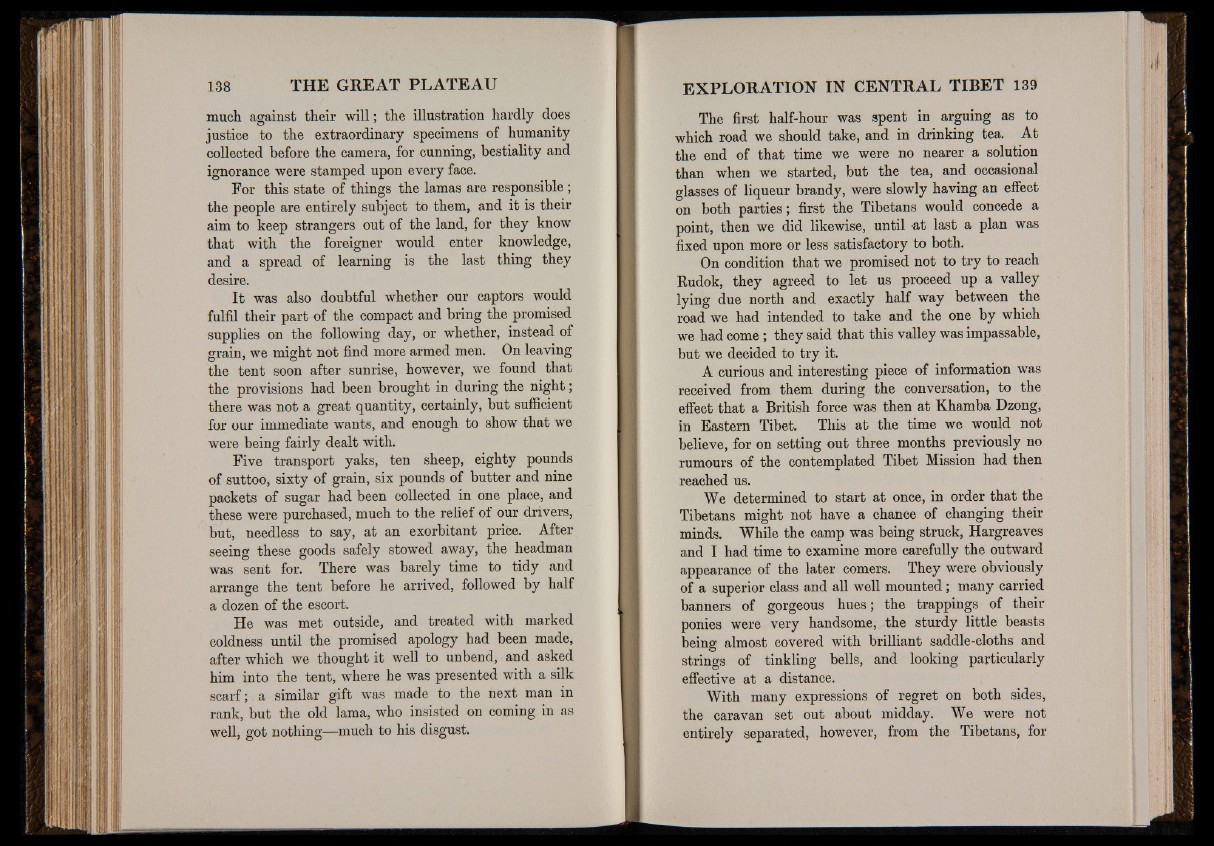
much against their will; the illustration hardly does
justice to the extraordinary specimens of humanity
collected before the camera, for cunning, bestiality and
ignorance were stamped upon every face.
For this state of things the lamas are responsible ;
the people are entirely subject to them, and it is their
aim to keep strangers out of the land, for they know
that with the foreigner would enter knowledge,
and a spread of learning is the last thing they
desire.
It was also doubtful whether our captors would
fulfil their part of the compact and bring the promised
supplies on the following day, or whether, instead of
grain, we might not find more armed men. On leaving
the tent soon after sunrise, however, we found that
the provisions had been brought in during the n ight;
there was not a great quantity, certainly, but sufficient
for our immediate wants, and enough to show that we
were being fairly dealt with.
Five transport yaks, ten sheep, eighty pounds
of suttoo, sixty of grain, six pounds of butter and nine
packets of sugar had been collected in one place, and
these were purchased, much to the relief of our drivers,
but, needless to say, at an exorbitant price. After
seeing these goods safely stowed away, the headman
was sent for. There was barely time to tidy and
arrange the tent before he arrived, followed by half
a dozen of the escort.
He was met outside, and treated with marked
coldness until the promised apology had been made,
after which we thought it well to unbend, and asked
him into the tent, where he was presented with a silk
scarf; a similar gift was made to the next man in
rank, but the old lama, who insisted on coming in as
well, got nothing—much to his disgust.
The first half-hour was spent in arguing as to
which road we should take, and in drinking tea. At
the end of that time we were no nearer a solution
than when we started, but the tea, and occasional
glasses of liqueur brandy, were slowly having an effect
on both parties; first the Tibetans would concede a
point, then we did likewise, until at last a plan was
fixed upon more or less satisfactory to both.
On condition that we promised not to try to reach
Rudok, they agreed to let us proceed up a valley
lying due north and exactly half way between the
road we had intended to take and the one by which
we had come ; they said that this valley was impassable,
but we decided to try it.
A curious and interesting piece of information was
received from them during the conversation, to the
effect that a British force was then at Khamba Dzong,
in Eastern Tibet. This at the time we would not
believe, for on setting out three months previously no
rumours of the contemplated Tibet Mission had then
reached us.
We determined to start at once, in order that the
Tibetans might not have a chance of changing their
minds. While the camp was being struck, Hargreaves
and I had time to examine more carefully the outward
appearance of the later comers. They were obviously
of a superior class and all well mounted ; many carried
banners of gorgeous hues; the trappings of their
ponies were very handsome, the sturdy little beasts
being almost covered with brilliant saddle-cloths and
strings of tinkling bells, and looking particularly
effective at a distance.
With many expressions of regret on both sides,
the caravan set out about midday. We were not
entirely separated, however, from the Tibetans, for